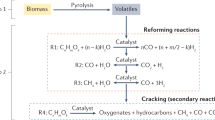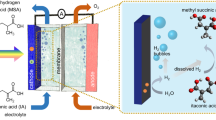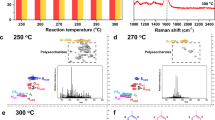Abstract
Concerns about the depletion of fossil fuel reserves and the pollution caused by continuously increasing energy demands make hydrogen an attractive alternative energy source. Hydrogen is currently derived from nonrenewable natural gas and petroleum1, but could in principle be generated from renewable resources such as biomass or water. However, efficient hydrogen production from water remains difficult and technologies for generating hydrogen from biomass, such as enzymatic decomposition of sugars2,3,4,5, steam-reforming of bio-oils6,7,8 and gasification9, suffer from low hydrogen production rates and/or complex processing requirements. Here we demonstrate that hydrogen can be produced from sugars and alcohols at temperatures near 500 K in a single-reactor aqueous-phase reforming process using a platinum-based catalyst. We are able to convert glucose—which makes up the major energy reserves in plants and animals—to hydrogen and gaseous alkanes, with hydrogen constituting 50% of the products. We find that the selectivity for hydrogen production increases when we use molecules that are more reduced than sugars, with ethylene glycol and methanol being almost completely converted into hydrogen and carbon dioxide. These findings suggest that catalytic aqueous-phase reforming might prove useful for the generation of hydrogen-rich fuel gas from carbohydrates extracted from renewable biomass and biomass waste streams.
This is a preview of subscription content, access via your institution
Access options
Subscribe to this journal
Receive 51 print issues and online access
$199.00 per year
only $3.90 per issue
Buy this article
- Purchase on Springer Link
- Instant access to full article PDF
Prices may be subject to local taxes which are calculated during checkout


Similar content being viewed by others
References
Rostrup-Nielsen, J. Conversion of hydrocarbons and alcohols for fuel cells. Phys. Chem. Chem. Phys. 3, 283–288 (2001)
Kumar, N. & Das, D. Enhancement of hydrogen production by enterobacter cloacae IIT-BT 08. Process Biochem. 35, 589–593 (2000)
Woodward, J. et al. Enzymatic hydrogen production: Conversion of renewable resources for energy production. Energy Fuels 14, 197–201 (2000)
Yokoi, H. et al. Microbial hydrogen production from sweet potato starch residue. J. Biosci. Bioeng. 91, 58–63 (2001)
Woodward, J., Orr, M., Cordray, K. & Greenbaum, E. Enzymatic production of biohydrogen. Nature 405, 1014 (2000)
Garcia, L., French, R., Czernik, S. & Chornet, E. Catalytic steam reforming of bio-oils for the production of hydrogen: Effects of catalyst composition. Appl. Catal. A 201, 225–239 (2000)
Amphlett, J. C., Leclerc, S., Mann, R. F., Peppley, B. A. & Roberge, P. R. Fuel cell hydrogen production by catalytic ethanol-steam reforming. Proc. 33rd Intersoc. Energy Convers. Eng. Conf. 269, 1–7 (1998)
Marquevich, M., Czernik, S., Chornet, E. & Montane, D. Hydrogen from biomass: Steam reforming of model compounds of fast-pyrolysis oil. Energy Fuels 13, 1160–1166 (1999)
Milne, T. A., Elam, C. C. & Evans, R. J. Hydrogen from Biomass: State of the Art and Research Challenges 1–82 (National Renewable Energy Laboratory, Golden, CO, 2002).
Greeley, J. & Mavrikakis, M. A first-principles study of methanol decomposition on Pt(111). J. Am. Chem. Soc. 124, 7193–7201 (2002)
Grenoble, D. C., Estadt, M. M. & Ollis, D. F. The chemistry and catalysis of the water gas shift reaction. 1. The kinetics over supported metal catalysts. J. Catal. 67, 90–102 (1981)
Hilaire, S., Wang, X., Luo, T., Gorte, R. J. & Wagner, J. A comparative study of water-gas shift reaction over ceria supported metallic catalysts. Appl. Catal. A 215, 271–278 (2001)
Iglesia, E., Soled, S. L. & Fiato, R. A. Fischer-Tropsch synthesis on cobalt and ruthenium. Metal dispersion and support effects on reaction rate and selectivity. J. Catal. 137, 212–224 (1992)
Kellner, C. S. & Bell, A. T. The kinetics and mechanism of carbon monoxide hydrogenation over alumina-supported ruthenium. J. Catal. 70, 418–432 (1981)
Vannice, M. A. The catalytic synthesis of hydrocarbons from H2/CO mixtures over the group VIII metals V. The catalytic behaviour of silica-supported metals. J. Catal. 50, 228–236 (1977)
Bates, S. P. & Van Santen, R. A. Molecular basis of zerolite catalysis: A review of theoretical simulations. Adv. Catal. 42, 1–114 (1998)
Gates, B. Catalytic Chemistry (Wiley, New York, 1992)
Eggleston, G. & Vercellotti, J. R. Degradation of sucrose, glucose and fructose in concentrated aqueous solutions under constant pH conditions at elevated temperature. J. Carbohydr. Chem. 19, 1305–1318 (2000)
Kabyemela, B. M., Adschiri, T., Malaluan, R. M. & Arai, K. Glucose and fructose decomposition in subcritical and supercritical water: Detailed reaction pathway, mechanisms, and kinetics. Ind. Eng. Chem. Res. 38, 2888–2895 (1999)
Collins, P. & Ferrier, R. Monosaccharides: Their Chemistry and Their Roles in Natural Products (Wiley, West Sussex, England, 1995)
Li, H., Wang, W. & Deng, J. F. Glucose hydrogeneration to sorbitol over a skeletal Ni-P amorphous alloy catalyst (Raney Ni-P). J. Catal. 191, 257–260 (2000)
Blanc, B., Bourrel, A., Gallezot, P., Haas, T. & Taylor, P. Starch-derived polyols for polymer technologies: Preparation by hydrogenolysis on metal catalysts. Green Chem. 2, 89–91 (2000)
Narayan, R., Durrence, G. & Tsao, G. T. Ethylene glycol and other monomeric polyols from biomass. Biotechnol. Bioeng. Symp. 14, 563–571 (1984)
Tronconi, E. et al. A mathematical model for the catalytic hydrogenolysis of carbohydrates. Chem. Eng. Sci. 47, 2451–2456 (1992)
Larminie, J. & Dicks, A. Fuel Cell Systems Explained 189 (Wiley, West Sussex, England, 2000)
Amphlett, J. C., Mann, R. F. & Peppley, B. A. On board hydrogen purification for steam reformer/PEM fuel cell vehicle power plants. Hydrogen Energy Prog. X, Proc. 10th World Hydrogen Energy Conf. 3, 1681–1690 (1998)
Acknowledgements
We thank K. Allen, J. Shabaker and G. Huber for assistance in reaction kinetics measurements. We also thank G. Huber for help with catalyst preparation/characterization and for TOC analyses, and M. Sanchez-Castillo for assistance with analysis of reaction products. We thank M. Mavrikakis and researchers at Haldor Topsøe A/S for reviews and discussion. This work was supported by the US Department of Energy (DOE), Office of Basic Energy Sciences, Chemical Science Division.
Author information
Authors and Affiliations
Corresponding author
Ethics declarations
Competing interests
R.D.C. and J.A.D. have co-founded a start-up company (Virent Energy Systems, limited-liability company) to develop the technology described in this paper for producing hydrogen from oxygenated hydrocarbons.
Rights and permissions
About this article
Cite this article
Cortright, R., Davda, R. & Dumesic, J. Hydrogen from catalytic reforming of biomass-derived hydrocarbons in liquid water. Nature 418, 964–967 (2002). https://doi.org/10.1038/nature01009
Received:
Accepted:
Issue Date:
DOI: https://doi.org/10.1038/nature01009
This article is cited by
-
Decade Milestone Advancement of Defect-Engineered g-C3N4 for Solar Catalytic Applications
Nano-Micro Letters (2024)
-
One Dimensional MoS2/MoP Heterostructures for Efficient Electrocatalytic Hydrogen Evolution Reaction
Catalysis Letters (2024)
-
Application of nanotechnology in hydrogen production from biomass: A critical review
Advanced Composites and Hybrid Materials (2024)
-
Cr and CeO2 promoted Ni/SBA-15 framework for hydrogen production by steam reforming of glycerol
Environmental Science and Pollution Research (2023)
-
Yttrium decorated fullerene C30 as potential hydrogen storage material: Perspectives from DFT simulations
Theoretical Chemistry Accounts (2023)
Comments
By submitting a comment you agree to abide by our Terms and Community Guidelines. If you find something abusive or that does not comply with our terms or guidelines please flag it as inappropriate.



